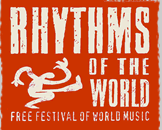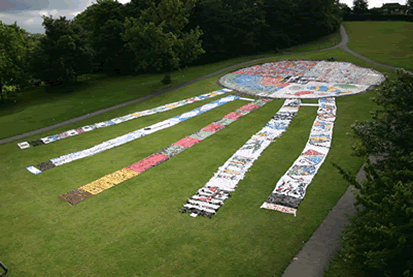

HISTORY: 2003
Another wonderful weekend: glorious weather, larger crowds, more market stalls, more stages – ROTW moves onto a different level again.
A glorious summer weekend saw the opening of the 2003 Rhythms of the World festival. It kicked off on Friday evening in the event's popular late night venue, Club 85, where ROTW fans were treated to a great night of Celtic roots with Tarantism headlining.
Throughout Saturday and Sunday the sun blazed down on the crowds of thousands who, as ever, gave in to the spirit of the ROTW festival. They delighted in each other's company, particularly the throngs gathering around the World Music stage of Portmill Lane and the 'urban picnic' set at Bancroft Gardens.
As always, there was a diverse selection of music genres: rock, acoustic, jazz, funk, reggae, celtic, urban, soul, hip-hop, indie, rap, bhangra, latin, dub, electronica and percussion-based music. All that along with the fantastic atmosphere and crowds made for another unforgettable weekend.
An exciting new development was the participation of St Mary's Church. This stage was a wonderful success, the spirituality of the space and the inclusiveness of the festival creating an atmosphere of its own. The Hitchin All Stars choir excelled at the kind of music St. Mary's might be used to, whilst Soname's haunting Tibetan Mountain Songs, inspired by nomadic communities wandering vast bleak landscapes, sounded beautifully at home in this Hitchin church. The day culminated in an improvisation by Soname, Lol Coxhill on sax and Suki Rayat on tabla. This collaboration across cultures and religions in a Christian church worked well on all levels – essential ROTW.
Another first was the street Art Project. Paintings on international/music/ethnic themes created splashes of colour throughout the festival. They were painted by local children, mostly from Wilshere Dacre School, and this was a pilot project that is set to grow in 2004.
The crowds of the Portmill stage were gathered early by Toque Tambor, Hitchin's own samba drummers who paraded through the town. Music from all around the world reached the ears of Hertfordshire's music lovers, including an interesting collaboration, aptly named "From Celtic Roots to Oceanic Soul", mixing traditional Maori music with contemporary Celtic sounds. On Saturday evening this stage erupted in a blaze of light with the explosive 13-piece Cuban jazz funk band Motimba, and on Sunday the crowd of thousands danced to the reggae rhythms of No 1 Station in warm evening sunshine.
My personal favourite for choice sets had to be the ironic progression from No Rush to Rush Hour at the popular Market Place stage, this year set aside for mellow young acts.
All in all, no-one could say that the Rhythms of the World hasn't come on by leaps and bounds since it started, and 2003 took a bound no less. Congratulations to all involved, and thank you to all loyal appreciators. Without the help of all our volunteers and contributors there would be no way that a free festival of such large scale could take place.
This year saw new stages at Bancroft Gardens, a chill-out family picnic area and the return of the Town Hall stage. The Main Stage moved to Portmill Lane, initially owing to Town Centre road works, but the extra space was essential to accommodate the larger crowds.
ROTW attracted a lot of media attention including a four-page wrap on the Comet and six hours of live broadcast from the Main Stage on BBC Three Counties Radio. A sixty-two page stand-alone programme on sale at the festival ensured that people knew exactly what was going on.
Involvement of St Mary's Church, more community groups, Club 85 and the Street Art Project assisted by Wilshere Dacre school all contributed to the sense that ROTW has become an established and welcomed community festival.
All this and another first: ROTW ended its financial year with £3,000 in the bank towards 2004 – a welcome development after the £1,500 deficit last year.

